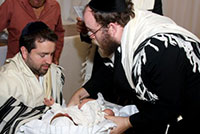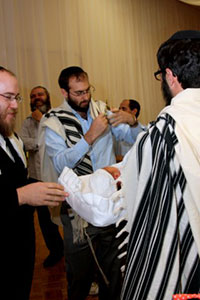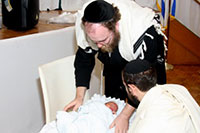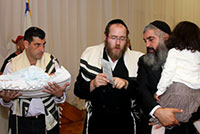 |
 |
About the Bris
The Bris milah is a religious ceremony within Judaism which welcomes infant Jewish boys into a covenant between God and the Children of Israel through ritual circumcision performed by a mohel ("circumciser"). The word Bris means "covenant" and the word Milah means "circumcision". This happens on the eighth day of the child's life in the presence of family and friends, and is followed by a festive meal.
Customs & Practices
The Shalom Zachar
"Vach Nacht" It is appropriate to keep some light on in the child's room throughout the night. It is also customary for the father, the Mohel, and the Sandek (the person who holds the infant during the circumcision) to immerse in a Mikvah (ritual bath) on the morning of the Bris.
The Proper Time A Bris may be carried out on Shabbat or even on Yom Kippur, providing that that is the eighth day from birth. If, however, the Bris had to be postponed (due to medical reasons such as jaundice or sickness), then it cannot be done on Shabbat or Jewish holidays. In addition, a baby that was delivered through an unnatural birth (such as a Caesarian section) has its Bris done on the eighth day from birth, providing that it is not a Shabbat or Yom Tov.
He undergoes intense training, learning the latest hygienic and medical techniques needed for the circumcision. He also receives instruction for evaluating the infant prior to the circumcision, and for providing post-procedural care. All this is done under the close supervision of a veteran expert Mohel. The Sandek is the person given the honor of holding the child throughout the Bris. The Sandek should be a pious person. Our Sages teach that the good qualities possessed by the Sandek are passed over to the baby. For this reason the honor should be given to someone whose thoughts are pure and who is worthy to sit next to Elijah the prophet. One does not give the honor of being Sandek to the same person for two of their children, so that this merit can be granted to two different individuals. Many observe the custom that the two grandfathers are given the honor of Sandek for the first two children. After the Sandek sits down, his hands are sanitized with alcohol. He is shown by the mohel, how to sit, and is instructed to refrain from any movement during the circumcision.
Then, a designated female and male serve as messengers to bring the baby from the mother's arms to the side of the room where the circumcision will be performed. These messengers are called kvatters. The kvatters are usually a husband-and-wife team. However, they may also be a daughter and father, a mother and son or a sister and brother. Many give this honor to a childless couple. It is considered a blessing for the childless couple, that in the merit of being the parents' messengers, they will be blessed with a child of their own. Many have the custom that a pregnant woman should not be the messenger. The mother hands her baby to the female messenger, who is dressed in her finest clothing. She in turn hands him over to the male messenger, who, wearing his tallit, prayer shawl, carries the child and hands him to a designated individual whose honor it is to place the infant on the Chair of Elijah. When the child is brought in to the area in which the Bris will take place, all present should rise and remain standing throughout the duration of the Bris. Only the Sandek will remain sitting throughout the Bris, while holding the infant on his lap. When the circumcision is complete, the kvatters return the infant to his mother in the same manner.
The Bris Ceremony Then he begins the circumcision. The father recites the blessing, "Blessed are You, L rd our G d, King of the universe, Who has sanctified us with His commandments and commanded us to enter him into the Covenant of Abraham our father." Those present respond, "Just as he has entered into the Covenant, so may he enter into Torah, into marriage, and into good deeds." Following the Bris procedure the Mohel applies some medical ointments to promote healing.
The Issue of Pain during Circumcision
We do not name the child before the Bris, being that the Divine soul begins to shine its light only from the moment of the Bris when the body and soul are fully united. Therefore, since the Jewish name is connected to the soul, the Bris is the most appropriate time to give the child his Jewish name.
Ceremony following the Bris After the meal, the participants recite a special series of prayers, including a prayer asking that as a reward for properly fulfilling the mitzvah of circumcision, we should merit to speedily see the coming of the Messiah and the end of human strife.
The Pidyon Haben Pidyon HaBen applies only to males who are firstborn; that is, there were no previous miscarriages. In addition, the child must be born naturally, and not through any unnatural methods such as a C-section. If the mother is a daughter of a Kohen or a Levite, or if the father is a Kohen or a Levite, the child does not have to be redeemed. If a grown man was not yet redeemed by his father, he should then redeem himself from a Kohen.
|
||
(c) NeedaMohel.com 2011 - Web Design by Braintoaster Interactive
 The Mohel and the Sandek
The Mohel and the Sandek The Messengers - Kvatters
The Messengers - Kvatters Elijah's Chair
Elijah's Chair Naming the Baby
Naming the Baby